134 Search Results for iep
May 28, 2013
by Robin Parker -
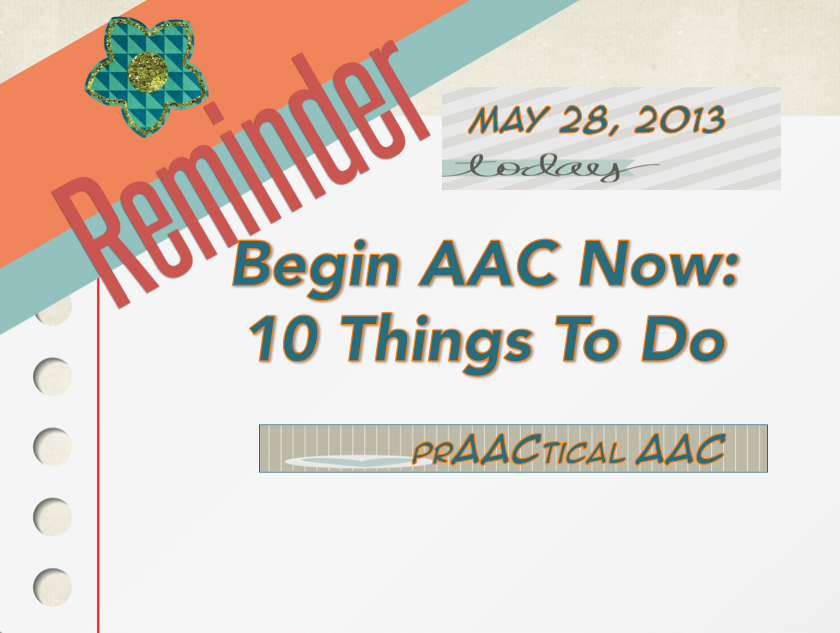
If you know someone with significant speech difficulties, BEGIN AAC NOW…. If you know someone, try something… Doing something, even if it isn’t perfect, is infinitely better than doing nothing at all…. There is no specific order for these suggestions, try what is appropriate and doable for you… A year from now you may wish you started today (K. Lamb)… So begin now at any level.. for someone, a class, a clinic, for a few… Create a Visual Language & AAC Environment: Visual Immersion Program, Meaningful Language Experiences, Importance of Using Visual Supports Speak AAC to the AAC Learner: Use Aided Language Input (ALI), Learning to Use ALI Get Assessment Information: Communication Matrix , AAC Evaluation Genie, Thoughts & Ideas, AAC Assessment Forms, Write & Implement Some AAC Goals: Goals That Matter, AAC in the IEP by Lauren Enders, PrAActical Goals Learn and Use a Core Word Approach: Core Word Communication Board Samples, About Core Words- First... [Read More...]
May 26, 2013
by Carole Zangari -
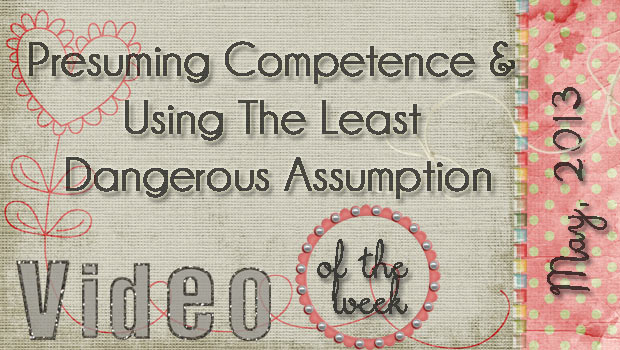
One of our core language posts from last month referred to the criterion of the least dangerous assumption (Donellan, 1984). This week we’re pleased to be able to expand on that topic and share a video by Dr. Cheryl Jorgensen, a former project director at the Institute on Disability at the University of New Hampshire. As we near the end of a school year in the US and begin IEPs that will direct the activities for the next academic year, we’re all reminded how critical it is to set high but attainable goals. Sometimes, that means making the least dangerous assumption. You can view the video here. Donnellan, A. (1984). The criterion of the least dangerous assumption. Behavior Disorders, 9, 2, 141-150.
May 3, 2013
by Robin Parker -
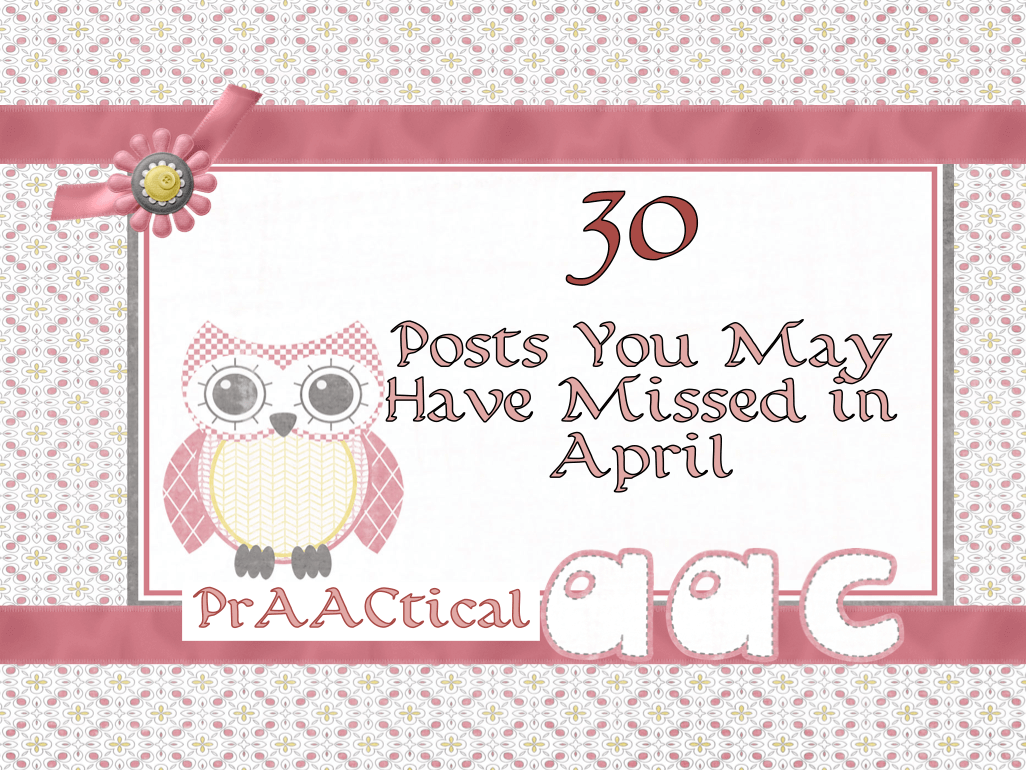
PrAACtical Thinking Happy April: Celebrate Autism Acceptance Month and National Poetry Writing Month Happy World Autism Day! 5 Ways to Get More Popular AAC Style 133 Free or Lite Versions of AAC Apps & App Selection Resources 5 Things To Do If You Are Not Confident Teaching Core Vocabulary 31 Posts You May Have Missed in March Communication Circles:With A Little Help From My Friends Core Vocabulary: Making Sense of Symbols AAC & RTI 5 Reasons for Using Pre-Stroed Messages in AAC Systems Speak To Me With Your Eyes My Love Keep Learning About Core Words: 8 More Things to do for Autism Acceptance Month A PrAACtical Look: AAC at the Baldwin Wallace Speech Center PrAACtical Goals That Matter 5 Ways to Use Powerpoint in AAC Intervention Strategy of The Month Teaching Core Vocabulary The First 12: Getting Started with Core Words More on Teaching Core Vocabulary More on Core... [Read More...]
April 24, 2013
by Robin Parker -
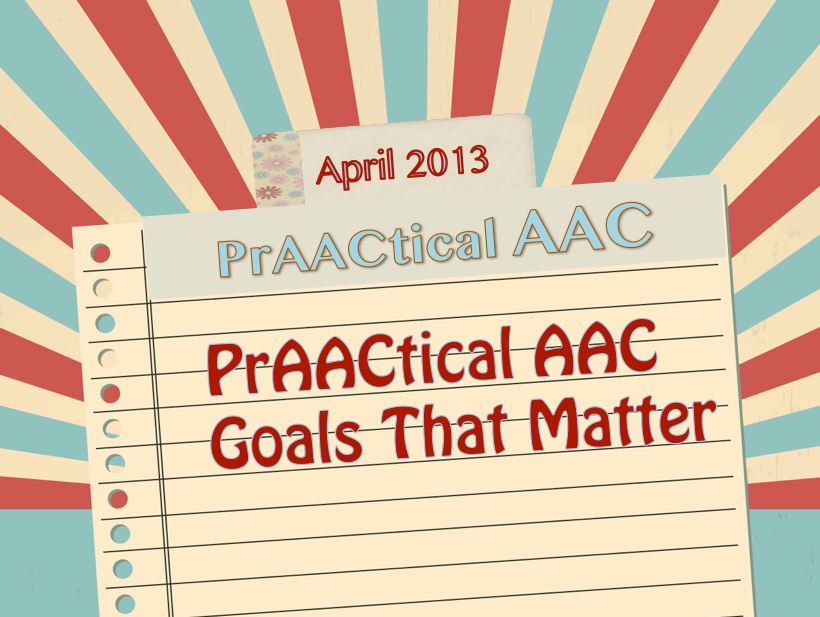
We can not say enough about writing AAC goals that are meaningful to the AAC user, but sometimes this is easier said than done. During discussions in a graduate seminar class, it was apparent that goal writing is not necessarily intuitive or even specifically taught. Goals are also the foundation behind any toy, app, or materials we use to set the stage for meaningful language experiences. Sample goals can serve as inspiration to develop specific, measurable, individualized AAC goals. For comprehensive information on a range of AAC goals, check out our PrAACtical Goals That Matter or How I Do It- AAC in the IEP by Lauren Enders. But to get started, here are some selected expressive language goals written AAC style. Expressive Language Using Prestored Messages (i.e., multiple words/sentences on one cell/button; E.g., a button with “I want music”) Request a turn using prestored messages (e.g., “Hey, don’t forget me! I... [Read More...]
April 9, 2013
by Robin Parker -
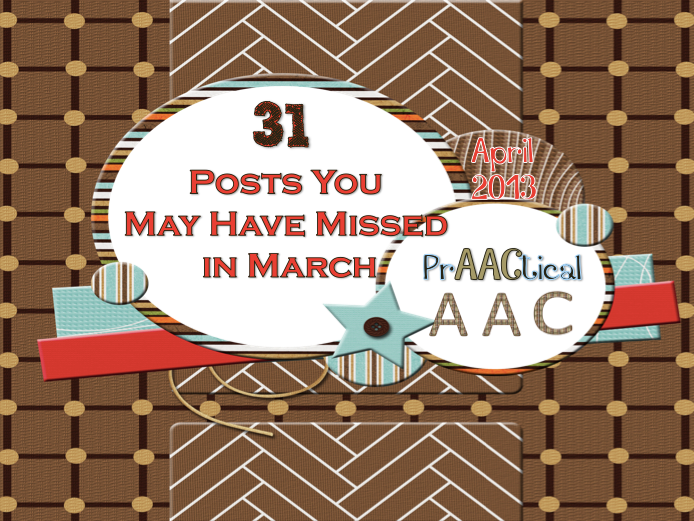
Strategy of The Month Narrative Skills for People with AAC Needs PrAACtical AAC & Personal Narratives Narrative Assessment & People Who Use AAC Let Me Tell You Something: Narratives for the Beginning Communicator Helping People with AAC Needs Develop Personal Narratives PrAACtical Thinking PrAACtical Guessing: 5 APPs for Interactive Inferencing Another Look at Vocabulary Instruction in AAC Magic Moments in Building Vocabulary with ‘Its Cool to be Clever’ It’s PrAACtically Saint Patrick’s Day 28 Posts You May Have Missed in February 10 AAC Things To Do for PrAACtically Free in 10 Minutes of Less Daylight Savings Time & PrAACtical Behavior Another Look At Language Facilitation Strategies to Make AAC Learning Effective Literacy, AT, & Students with Significant Disabilities Watch This: Planning with Strategies Worth Repeating: Big Ideas in Teaching AAC Vocabulary PrAACtical Passover & Easter Supports 30 Things to do During Autism Awareness Month A Beautiful Family, But 1 Question... [Read More...]
March 2, 2013
by Carole Zangari -
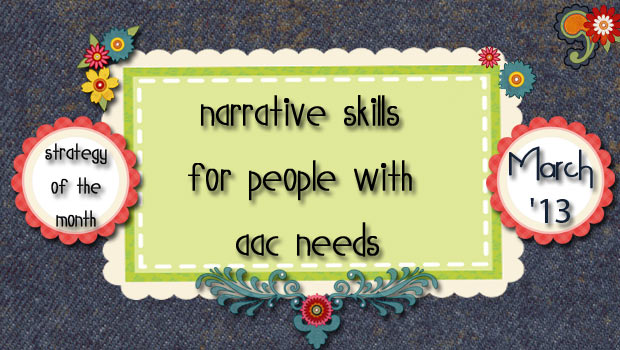
This month, we’ll share some thoughts about helping people with AAC needs develop narrative skills. Why narrative skills? Because they help us connect to one another and communication learning works best when we feel connected. Among other things, storytelling helps us relate to one another. Narrative language is important for reading and writing skills to develop. It helps us understand the world and ourselves. In telling our stories, we establish our identities. Plus, it’s part of what makes life fun. In the US, pediatric therapists are having lots of conversations about the Common Core State Standards (CCSS) in English Language Arts (ELA), and how they relate to the IEP goals of the students that they serve. Many of the goals in the ELA speaking domain require students to be able to summarize what they hear and read, so it is no surprise that SLPs are prioritizing narrative language and related... [Read More...]
February 22, 2013
by Carole Zangari -
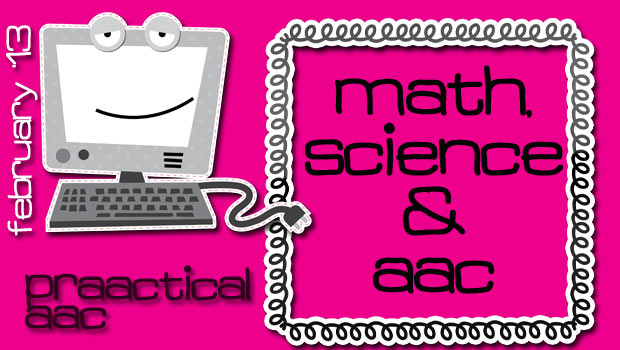
In an earlier post, we began sharing content on AAC and inclusion based on articles from ASHA’s Special Interest Group (SIG) quarterly publication, Perspectives on AAC. Although the final versions are available only to SIG members, clearance has been given to post the original articles. Today, we are pleased to share the work of Michele Boruta and Kara Bidstrup. In this article, they discuss a process for using standards‐based math and science curricula to build the linguistic competence of students who use AAC. In the US, there is an increasing focus on using the curriculum as the launching point for all IEP-driven intervention. Though the mandate for using curricula as the context for therapies is not new, many SLPs are still getting comfortable with this approach. We hope this article provides some prAACtical guidance for therapists who are striving to integrate AAC teaching with curriculum content. Thank you to Ms.... [Read More...]
January 25, 2013
by Carole Zangari -
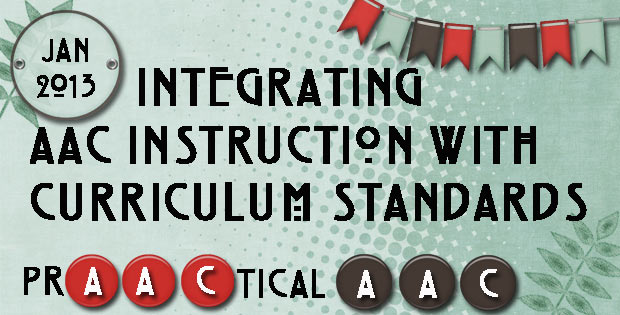
Many of our prAACtical AAC friends are members of ASHA’s Special Interest Group (SIG) on AAC and are able to access their quarterly publication, Perspectives on AAC. I was fortunate to be invited to submit an article for the September 2012 edition, guest edited by Gail Van Tatenhove, on the topic of including students with robust AAC devices in general education classrooms. Access to the final publication is limited to those who are ASHA SIG members, but Gail did get clearance for authors to be able to share their original unedited works. Several of those authors have given permission for their articles to be published on the Minspeak website and also here on our site. In this post, we would like to share the work of Solana Henneberry, Jennifer Kelso, and Gloria Soto. This article describes a process of developing an AAC intervention plan that relate to the Common Core... [Read More...]
December 24, 2012
by Carole Zangari -
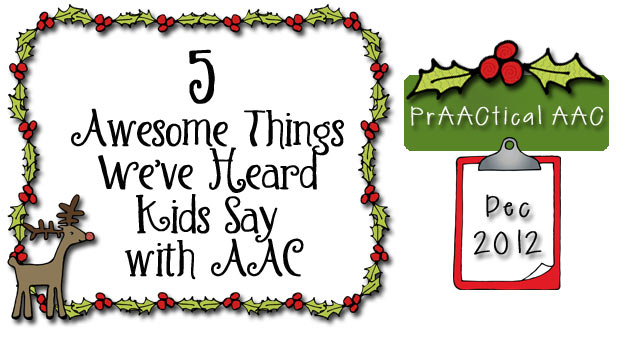
Listen up, friends. Kids are talking with AAC and saying some terrific things. Here are some of our favorites. 1. “Can you scan that, please? It’s on my IEP.” (It’s never too early to learn self-advocacy skills.) 2. “Tell me more.” (We love ‘language magnets!’) 3. “Why [did] you do that to me?” (Hold people accountable. It works.) 4. “No!” (Everyone has the right to express displeasure. Using language rather than behavior to do so gets a big thumbs-up from us.) 5. “You [are] nice.” (Everyone needs a little compliment once in awhile. Folks who know how to give them have an easier time making friends.) How about you? What awesome things have you heard kids say with AAC?
November 23, 2012
by Carole Zangari -

When we’re writing AAC evaluation reports, compiling funding documents, and summarizing the present level of performance in IEPs, we frequently comment on speech intelligibility. In some cases, we’ve administered a standardized assessment instrument and are sharing those results. Often, though, the comments are more descriptive in nature. It is not uncommon to read documentation in which someone with articulation difficulties is described as having speech intelligibility that is mildly, moderately, or severely impaired. Those categories are pretty broad, open to interpretation, and can be quite vague. What do we really mean when saying that someone does or doesn’t have intelligible speech? To narrow down the meaning, we specify the two variables that have the greatest influence on how comprehensible the communicator’s speech output actually is: the context and the communication partner. Specifying whether the context is known and the partner is a familiar one, helps us better interpret the descriptors... [Read More...]









